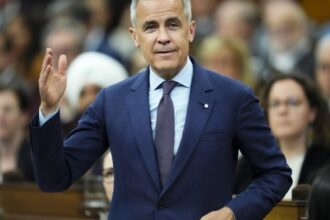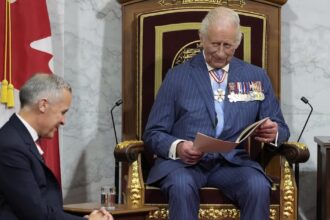In a strategic pivot that signals both diplomatic caution and economic pragmatism, Canada has temporarily suspended the implementation of certain retaliatory tariffs against the United States, marking a significant development in the ongoing trade tensions between the two neighbors. The suspension, announced Thursday by Deputy Prime Minister Chrystia Freeland, affects approximately CA$1.1 billion ($800 million) in planned counter-measures that were set to take effect July 1.
“This pause is a measured response to the complex economic realities we face,” Freeland stated during her announcement in Ottawa. “While we remain firmly committed to defending Canadian interests, we recognize the value in creating space for continued dialogue and negotiation.”
The suspended tariffs were originally designed as a dollar-for-dollar response to Washington’s duties on Canadian aluminum and steel imports. The Canadian government, however, will proceed with implementing approximately CA$3.1 billion in other retaliatory measures against American goods, demonstrating that this pause represents a calibration rather than a complete reversal of Canada’s trade stance.
Analysis from the CO24 Business desk indicates this move comes at a particularly sensitive moment, with both nations navigating domestic economic pressures and broader global trade uncertainties. The partial suspension affects primarily agricultural products and certain manufactured goods, sectors where Canadian officials determined a temporary reprieve might create the most favorable conditions for renewed negotiations.
Trade experts point to the upcoming U.S. presidential election as a significant factor in Canada’s decision-making calculus. “The Canadian government is likely trying to avoid unnecessarily inflaming trade tensions during a politically volatile period in the U.S.,” explains Dr. Eleanor Winters, senior fellow at the Canadian Institute for Trade Policy. “This creates breathing room while maintaining leverage through the remaining tariffs.”
The suspension also reflects the deep economic interdependence between the two nations. Canada News reports indicate that bilateral trade exceeded $875 billion last year, with supply chains deeply integrated across virtually every sector of both economies. This interconnection makes trade disputes particularly costly for businesses and consumers on both sides of the border.
U.S. Trade Representative Katherine Tai responded to Canada’s announcement with cautious optimism, stating that her office “appreciates Canada’s gesture” while emphasizing that fundamental differences regarding aluminum and steel tariffs remain unresolved. Sources within the Biden administration suggest this partial de-escalation could create conditions for more substantive negotiations in the coming months.
For Canadian businesses caught in the crossfire of these trade tensions, the partial suspension offers limited but welcome relief. The Toronto Chamber of Commerce described the move as “prudent risk management” while urging both governments to work toward a comprehensive resolution that provides long-term predictability for businesses.
The remaining retaliatory tariffs will target American products ranging from bourbon whiskey to washing machines, carefully selected to maximize political impact in key U.S. states while minimizing disruption to Canadian supply chains and consumer pricing. These measures will proceed as scheduled beginning July 1.
As both nations navigate this delicate trade relationship, fundamental questions remain about how to achieve lasting stability in cross-border commerce. Will this calculated pause provide the diplomatic opening needed for a more comprehensive trade reset, or merely delay an inevitable escalation in an increasingly fragmented global trading system?










